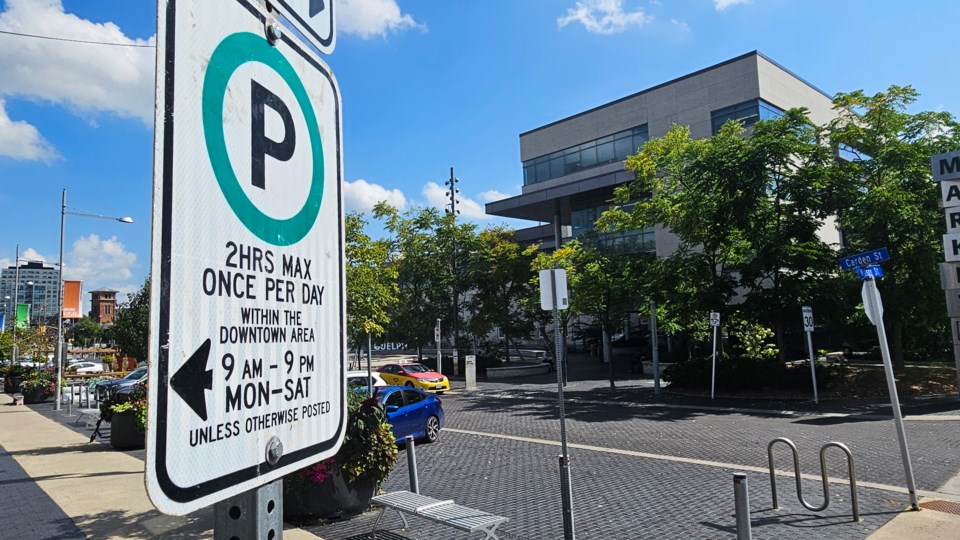New developments in Downtown Guelph will no longer be required to provide a parking space for every residential unit.
In a 11-2 vote, city council opted to lower the minimum parking requirement to 0.85 per unit from one per unit – a 15 per cent reduction.
“I am very concerned about the unintended consequences and challenges of increasing density that can occur where we have an issue where, potentially, on-street parking is used to subsidize the lack of parking in any given building,” said Coun. Phil Allt.
“Our transit is, at this point, merely future ready. It is not the future and that’s something that I think is important.”
Voting in opposition were Mayor Cam Guthrie and Coun. Rodrigo Goller. Guthrie moved an amendment that, had it been approved, would have seen the minimum parking requirement eliminated in the downtown.
“I want to fight for this,” Guthrie said, appearing via video from Denmark where he’s attending a research initiative aimed at the creation of “healthy urban planning” policy. “If you take the climate crisis seriously, if you take the affordability issue seriously, if you want to try to move people (away from personal vehicles) … this is the way to go.”
Guthrie’s amendment failed 10-3, with Goller and Coun. Carly Klassen in support.
In a text exchange with GuelphToday, Guthrie said in light of the 11-2 decision, he isn’t planning to use his veto power under the strong mayor system to override council’s decision. A two-thirds supermajority (nine votes in the case of Guelph) is enough to cancel a mayoral veto.
During its committee of the whole meeting earlier this month, council tentatively approved a reduction from one space per unit to 0.85. However, several members of council questioned why the recommended reduction wasn’t more.
In the time since, city staff prepared a memo outlining numerous concerns with doing so.
Among them is that there’s no way to ensure developers pass on the savings to residents; there would be an increased demand on the public parking system; transit enhancements would be needed to accommodate demand; and nearby neighbourhoods can’t accommodate increased on-street parking.
“The further council reduces the recommended 0.85 parking rate, the greater likelihood the risks identified in the memo will occur,” the memo’s author, Jamie Zettle, the city’s program manager for parking engineering and transportation services, told council. “Any deviation from the staff recommendation … should require another statutory public meeting..”
In a letter to council, the Downtown Guelph Business Association (DGBA) urged council to adopt the staff recommendation of 0.85 parking spaces per unit.
“We would strongly caution against any further reduction as other centres like Cambridge have experienced issues when the reducing the requirement too low,” wrote DGBA chair Chuck Nash. “Strong and thorough evaluation should be considered on a project by project basis but our concern is a further reduction would put too much pressure on public parking spaces.”
Several developers spoke and wrote to council in support of further reducing or eliminating parking minimums in the core, claiming they’re the ones left holding the bag if people don’t want a parking space.
“We’re concerned we’re going to be left with too much parking,” said Jonathan Westeinde of Windmill Developments, which is behind a proposal for two, 15-storey residential towers and stacked townhouses along Baker Street.
If people want parking and they didn’t build enough, “then I am left with a building that isn’t occupied,” he added.
In response, several council members noted it would be taxpayers who are forced to cover the cost of not only transit enhancements but any new parking lots required if demand is greater than developers thought.
Two follow-up motions received unanimous support – that eliminating minimum parking requirements be considered as part of the 2028 staff review of the downtown parking master plan, and that parking requirements be considered for affordable housing projects when a related report comes forward in early 2024.
